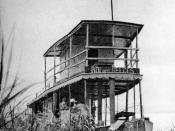"Africa," wrote Graham Greene, "will always be the Africa in the Victorian atlas, the blank unexplored continent in the shape of the human heart." The African heart described by Greene "acquired a new layer of meaning when Conrad portrayed the Congo under King Leopold as the Heart of Darkness, a place where barbarism triumphs over humanity, nature over technology, biology over culture, id over super ego." (McLynn, ix).
The unknown and uncharted topography of the African continent first beckoned Conrad's narrator, Marlow, into its depths in his boyhood: "Now, when I was a little chap I had a passion for maps. I would look for hours at South America, or Africa, or Australia, and lose myself in all the glories of exploration" (Conrad, 5). When Marlow was grown and Africa was no longer a blank space on the map, but rather "a place of darkness," there was still one river there that drew him especially, "a mighty big river, that you could see on the map, resembling an immense snake uncoiled, with its head in the sea, its body at rest curving afar over a vast country, and its tail lost in the depths of the land" (Conrad, 5-6).
This same deep place that had seduced Conrad's ivory hunting Kurtz into the horrors of its savage embrace had, in 1890, lured Conrad himself into adventure that turned him from sailor to writer (Smith, 25) and severely effected his health for the rest of his life (Conrad,v). As the voyage up the Congo proved fateful for the development of Conrad's narrator, Marlow, it was equally fateful for Conrad's individuation, as he reflects in his letters "Before the Congo I was just a mere animal." (Jean-Aubrey, 141)
Hillman, in "Notes on White Supremacy" reminds us that, like Conrad, both Freud and Jung...


